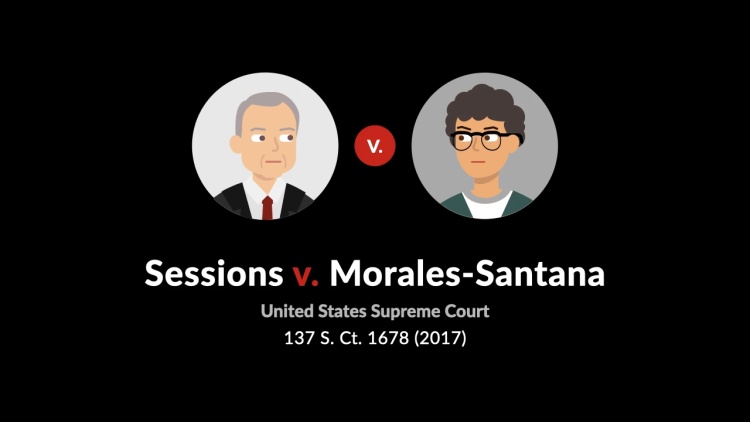Sessions v. Morales-Santana
United States Supreme Court
137 S. Ct. 1678, 198 L. Ed. 2d 150, 582 U.S. 47 (2017)
- Written by Angela Patrick, JD
Facts
The Immigration and Nationality Act (the act) governed the citizenship of a child born abroad to one US-citizen parent and one non-US-citizen parent. Under the act’s original language, if the citizen parent was the child’s father, the child would be a US citizen only if the father had been physically present in the United States for 10 years prior to the child’s birth and at least five of those years were after the father turned 14. If the citizen parent was the child’s mother, the child would be a US citizen if the mother had lived continuously in the United States for one year before the child’s birth. One purpose of these requirements was to restrict citizenship to children whose parents had lived in the United States long enough to assimilate to American culture. In 1962, Luis Ramón Morales-Santana (defendant) was born in the Dominican Republic. Morales-Santana’s father was American, and his mother was Dominican. However, Morales-Santana’s father had moved from the United States 20 days short of his nineteenth birthday. Because Morales-Santana’s father had not lived in the United States for five years after the age of 14, Morales-Santana did not qualify for US citizenship under the version of the act in effect when he was born. Morales-Santana moved to the United States when he was 13 years old and lived in the country for more than two decades. While Morales-Santana was living in the United States, the act was amended to reduce a father’s residency requirement to five years of continuous presence in the United States, including two years after the age of 14. However, the act’s prior version still applied to Morales-Santana. In 2000, the federal government (plaintiff) determined that Morales-Santana was not a US citizen and began deportation proceedings. Morales-Santana argued that he was a US citizen based on his father’s citizenship, but the immigration judge rejected that claim. Morales-Santana moved to reopen the matter, arguing that the version of the act being applied to him violated the Equal Protection Clause because it discriminated against men. The Board of Immigration Appeals denied the motion. The Second Circuit reversed, holding that (1) the act’s different treatment of unwed mothers and fathers was unconstitutional and (2) Morales-Santana had citizenship through his father. The United States Supreme Court granted certiorari.
Rule of Law
Issue
Holding and Reasoning (Ginsburg, J.)
Concurrence (Thomas, J.)
What to do next…
Here's why 907,000 law students have relied on our case briefs:
- Written by law professors and practitioners, not other law students. 47,100 briefs, keyed to 996 casebooks. Top-notch customer support.
- The right amount of information, includes the facts, issues, rule of law, holding and reasoning, and any concurrences and dissents.
- Access in your classes, works on your mobile and tablet. Massive library of related video lessons and high quality multiple-choice questions.
- Easy to use, uniform format for every case brief. Written in plain English, not in legalese. Our briefs summarize and simplify; they don’t just repeat the court’s language.





